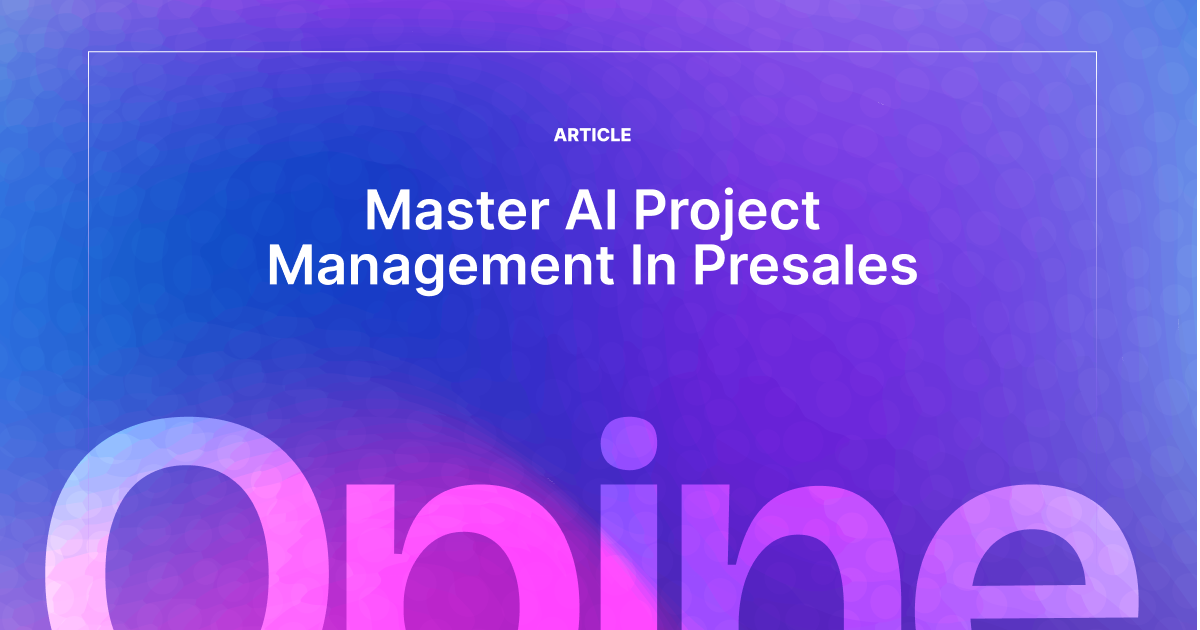Presales solutions engineering teams manage a lot of moving parts. From technical evaluations and solution design to stakeholder alignment, the work often spans multiple tools, teams, and timelines. Coordinating it all can feel like juggling in a wind tunnel.
Traditional project management methods are often not designed for the fast, technical and complex nature of presales. Tasks slip through the cracks. Context gets lost. Follow-ups go missing. The result is a workflow that's reactive, not strategic.
Artificial intelligence is starting to change that. By introducing automation and intelligent tracking into presales workflows, AI is shifting how teams plan, execute, and manage technical sales engagements.
This article explains the concept of AI project management in presales. It covers how it works, what it includes, and how it differs from traditional project coordination.
What Is AI Project Management For Presales
AI project management for presales refers to the use of artificial intelligence to organize and coordinate the processes that happen during technical sales cycles. It focuses on automating routine tasks, identifying risks, and keeping workflows aligned across stakeholders automatically.
In a presales environment, this often includes activities like scoping, qualification, technical validation, and solution delivery. AI can help track these steps automatically, reducing the need for manual updates, status meetings, or searching for context from disparate sources.
AI systems used in presales project management are typically trained on past and current deal data. They use this information to suggest next steps, flag stalled deals, or recommend actions to keep momentum. These systems may also surface patterns in deal performance that are hard to catch manually, including buyer/stakeholder sentiment.
Key components of AI project management in presales include:
- Automation: AI handles recurring tasks such as document generation, deal updates, follow-ups, and more
- Analytics: AI analyzes trends in deal activity, engagement, and outcomes for both the buyer and the selling team
- Workflow Optimization: AI identifies inefficiencies and proposes adjustments to improve deal flow in key trends and insights for deals and team members
The goal is to centralize presales activity in a way that is less manual, more predictable, and easier to manage at scale in a single workspace, like Opine.
Will AI Replace The Presales Team
AI is not designed to replace presales teams. It is meant to assist with tasks that require processing high volumes of information, such as organizing schedules, tracking deal progress, or detecting delays in workflows.
People in presales, solution engineering roles rely on interpersonal communication, technical judgment, and strategic coordination. These tasks require understanding different emotions, perspectives, thinking creatively, and adapting to new situations on the fly. AI systems do not possess the ability to build trust with decision-makers but sales engineers do.
AI works by analyzing data, identifying patterns, and automating steps based on rules or past behavior. This supports human teams like a co-pilot by removing repetitive tasks and increasing access to relevant information. This enables sales engineers to accelerate the speed of the deal while building more confidence and trust with the buyer.
In presales, AI and humans work side by side. Each is responsible for tasks that align with its strengths.
Human Presales Strengths
AI Project Manager Strengths
Relationship building
Data processing
Complex negotiations
Task automation
Creative problem solving
Consistent tracking
Strategic thinking
Pattern recognition
Key Benefits Of AI For Presales Workflows
Why does every presales team need an AI project manager like Opine? The following sections outline specific functions and outcomes AI provides in presales workflows.
1. Enhanced Deal Visibility
AI collects and organizes deal data from different sources. It presents this data in real time so all team members and leaders see the same status for each deal in a single, unified workspace.
Visibility metrics AI can track automatically:
- Deal stage progression
- Stakeholder engagement levels
- Response times and follow-up status
- Success criteria monitoring
Key visibility advantages include real-time updates without manual input, trend identification across multiple deals, and bottleneck detection that pinpoints where deals slow down.
"The biggest challenge in presales is often not the technical work itself, but knowing exactly where each deal stands at any given moment." - Akash Ganapathi, CEO of Opine.
2. Leaner Administrative Tasks
AI automates tasks that are repetitive and time-consuming. This reduces hours spent on scheduling, documentation, and follow-ups. In most cases, Opine can reduce and redirect around 250 administrative hours per sales engineer per year. That’s instant ROI.
Tasks AI can automate:
- Business case and plan generation
- Creating and sharing technical documentation
- Sending reminders and updating deal statuses
- Tracking key performance metrics and more…
Presales teams often regain 4 hours of their weekly time through automation. This time can be reinvested in customer relationships and technical solution design.
3. Faster Pipeline Execution
AI shortens deal timelines by coordinating multiple tasks at the same time. It sends reminders and helps assign work based on team member availability.
How deal cycles shrink with AI:
- Tasks are processed in parallel, reducing delays between steps
- Reminders are sent to keep participants aligned with deadlines
- AI assigns work based on capacity and skill
- The buyer gets a new and engaging way to buy your product
This pipeline acceleration helps presales teams handle more deals without sacrificing quality or burning out team members. In the case of JupiterOne, Opine reduced their average sales cycle by 33% in just 6 months. Read the case study, here.
4. Intelligent Risk Analysis
AI monitors deal activity against patterns. It detects early signs of risk and suggests possible actions based on similar past cases. Finding blockers and highlighting not only the deal revenue associated with that blocker but an aggregated view across all deals with the same blockers as well. This helps prioritize your development resources to unlock these blockers and accelerate deals through your pipeline.
Risk factors AI can monitor:
- Delays in deal movement compared to similar deals
- Stakeholders not responding or interacting
- Unusual behaviors in the deal timeline
By identifying risks early, teams can address issues before they derail deals. This proactive approach to deal management improves win rates and creates more predictable sales forecasts.
How To Integrate AI Tools Into Existing Sales Processes
Integrating AI into presales workflows requires planning and a phased approach. Here's how teams can successfully adopt AI project management:
1. Assess Process Gaps And Goals
The first step involves reviewing your current presales process. This includes identifying areas where delays happen most often, where time is frequently spent, and what information is missing during deal execution.
Questions to consider:
- Where do deals most often get stuck?
- Which tasks take up the most time?
- What information would help make better decisions?
Common pain points that AI can address include manual data entry, lack of deal visibility, and slow response times.
2. Select The Right AI Platform
The second step involves selecting a tool that fits your sales engineering workflow. This tool should allow for customization, be simple to use, and provide accurate reporting.
Key features to look for:
- Customization options for your unique workflow
- Intuitive user experience for easy adoption
- Robust reporting and analytics
When evaluating platforms, consider how they integrate with existing CRM systems, what kind of onboarding support is available, and whether the platform can grow with your team.
3. Train Your Presales Team
The third step involves preparing the team to use the AI tool effectively. This includes training based on each person's role, introducing features gradually, and encouraging participation.
Training approaches:
- Role-specific training for different team members
- Milestone approach roll out features in phases
- Create AI champions to lead by example
Addressing resistance is important. Communicate how the tool will make each person's job easier, and gather feedback throughout implementation to make adjustments.
4. Measure Outcomes And Iterate
The final step is to track the impact of AI on your presales workflow. This includes collecting data on performance, reviewing team feedback, and updating the process over time.
Key metrics to monitor:
- Deal cycle times before and after AI implementation
- User satisfaction and adoption rates
- Impact on win rates and pipeline velocity
Regular review of these metrics helps teams refine their approach and maximize the value of AI in their presales process.
Common Myths About AI In Presales Projects
Several misconceptions about AI in presales can prevent teams from exploring its benefits. Here are the facts behind common myths:
1. AI Eliminates The Human Element
Myth: AI makes presales impersonal and robotic.
Reality: AI is used to support human tasks, not replace human interaction. It can complete repetitive work that takes time away from customer conversations and technical planning.
Research shows that teams using AI spend more time on direct customer engagement because they spend less time on administrative tasks.
2. Only Large Enterprises Need AI
Myth: AI is only useful for large companies with significant resources.
Reality: Smaller teams often benefit more from AI because it allows them to handle larger workloads without adding headcount.
A team of five using AI tools can complete the same number of tasks as a much larger team. This efficiency is especially valuable for growing companies with limited resources.
3. AI Implementation Is Plug And Play
Myth: AI tools work immediately without setup or training.
Reality: Implementing AI in presales involves preparation, configuration, and ongoing review. Teams often start with small goals and expand over time.
Initial setup usually takes several weeks, and success depends on factors like leadership support, clear priorities, and regular evaluation of results.
Where Opine Fits In Your Presales Transformation
Opine is a platform designed specifically for presales teams. It uses AI to manage technical sales workflows by organizing tasks, automating routine steps, and providing visibility into deal progress.
Opine's approach:
- Built specifically for sales engineering and presales workflows to lossless handoffs with post-sales
- Connects with existing sales tools like Gong, Slack, Salesforce, Jira and more
- Provides dashboards with actionable insights for deals and team performance
Teams using Opine have reported 30+% faster deal cycles and hours of less administrative work in their weekly workflows. The platform is designed to integrate with existing systems, so teams can implement it without disrupting their current processes. Tools like Opine create a single workspace where all your deal context lives enabling teams across the organization to always be in the loop, whenever and wherever they are.
To learn more about how Opine works in a presales environment, visit https://www.tryopine.com/schedule.
FAQs About AI Project Management In Presales
How secure is customer data in presales AI tools?
AI platforms like Opine for example employ enterprise-level security including data encryption, role-based access controls, and regular security audits to protect sensitive customer and deal information.
Can AI adapt to changing presales requirements during a deal cycle?
Yes, AI tools for presales project management like Opine are designed to adjust workflows, timelines, and resource allocations as deal requirements evolve by continuously learning from new inputs.
What skills should presales teams develop to work effectively with AI?
Presales professionals working with AI benefit from developing data literacy, strategic thinking, and the ability to translate AI-generated insights into meaningful customer conversations not to mention offloading substantial administrative tasks freeing them up for more meaningful work.
Get the latest in your inbox
Get weekly tips & strategies from your friends at Opine to close faster, reduce risk, and grow revenue.
Recent articles
Explore the Opine archive of blog articles on presales, sales, and customer success automation. From strategies, best practices, to angentic AI-driven revenue growth, you'll find it here.






